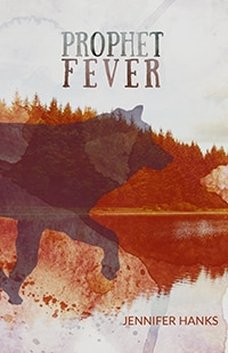
Publisher: Hyacinth Girl Press (2016)
Purchase: @ Hyacinth Girl Press
Review by April Michelle Bratten
Wren Hanks, formerly published as Jennifer Hanks, is a writer who often blends a distorted realm with a conscious reality. This union is effortless for Hanks, who writes in the grotesque and horror genres, and also, in the case of Prophet Fever, uses poetry as a vehicle to discover and inhabit self. Consisting of only 16 pages of poetry, Prophet Fever impressively weaves a dark and layered story.
These poems can seem quite ominous. The speaker, Wren, is haunted by the presence of a wolf: “I felt her breath on my neck like a quilt / She whispered / You are Wren the charcoal star”. As the story progresses the reader becomes aware that the wolf’s presence is key in Wren’s journey for acceptance and belonging. Is the wolf, in fact, a mysterious haunting? Or is she a piece of Wren’s subconscious, calling for the claiming of identity? Wren seems to have not only grown accustomed to the wolf, but finds an intriguing comfort in her presence:
The nights I drip in bed
I feel her fur against my side.
Feel her flame drop off—
as she wraps herself around me
like a coat I suddenly need. (6)
Hanks uses many references to animals throughout Prophet Fever, particularly animals of the canine variety. These animals, symbols of nature, are portrayed as raw or wild beings. Although they might become wounded or smaller, they do not question their purpose: “They whine spit out their molars all over the carpet. Blood colors / their water bowls like dried roses. They are puppies again gnashing / their swollen gums.” These dogs fascinate Wren, who seems to admire their willingness to be, but fears their truth might lead to something more complicated or perhaps even disastrous. “I am not ready to see what your animals will become.”
Religion is also interestingly woven into the story, proposed as both an enticement to Wren and a means for them to question their place in the world. Hanks writes in section 5, “A boy once put an ice cube in his mouth and held it to my neck. / He called me Sacred Heart Wren when I dripped wax from a prayer / candle onto his stomach.” Here, religion is used with a contradictory power, coaxing the name “Wren” from a lover’s lips, a lean towards claiming the self. However, Hanks pushes this idea much further in section 10:
What will happen when I die? I want to ask
No really ask No really
Mary is there a place
for these bodies
in the afterlife really?
And more important
Will I die?
Will I die?
Will I die alone?
If Wren is to claim the self, will they belong in the natural world? Will they be accepted after?
Not only a chapbook about seeking identity, Prophet Fever also explores the personal risk involved with claiming the self, especially for queer people. Hanks confronts the subject matter of belonging in a beautiful and unique way, questioning and challenging the state of the natural world and how queer bodies fit inside of it. Prophet Fever is a dark book, yes, but it’s also a deeply important book, flush with possibility: “The dogs sit down at my feet, every motion a door creaking open in / the night.”

Wren Hanks is the author of Ghost Skin (Porkbelly Press) and Prophet Fever (Hyacinth Girl Press). A 2016 Lambda Emerging Writers Fellow, their recent work appears or is forthcoming in Best New Poets 2016, Gigantic Sequins, Bone Bouquet, Drunken Boat, and elsewhere. Their third chapbook, gar child, is forthcoming from Tree Light Books in 2017. An Associate Editor for Sundress Publications, they live in Brooklyn and tweet @corsetofscales.
